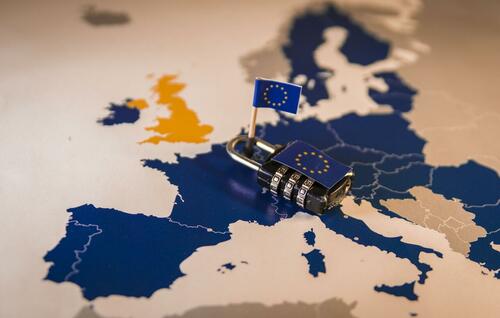In proclaiming the faith and in administering the sacraments every priest speaks on behalf of Jesus Christ, for Jesus Christ.
Distinction Matter - Subscribed Feeds
-
Site: PaulCraigRoberts.org
The Next Planned and Released Pandemic Is On Its Way
-
Site: PaulCraigRoberts.org
Elite Western universities form a corrupt and parasitic empire
https://www.rt.com/news/618349-elite-universities-corrupt-empire/
-
Site: PaulCraigRoberts.org
Czech Republic Joins Rest of Europe in Banning Truth and Free Speech
-
Site: AsiaNews.itThe visa restrictions announced by the White House particularly affect Chinese students, who now number 277,000 in the United States. However, their numbers had already been declining in recent years, with the growth of alternatives in Asian universities, particularly in Japan, South Korea and Singapore. While Chinese universities are climbing the rankings in technological disciplines, they suffer from limitations on freedom of thought in the humanities.
-
Site: southern orders
#1, The good bishop, bless his little heart, has shown the world and more than likely Pope Leo XIV just how mean, unjust and stupid TC is and this may well persuade Pope Leo to address this unjust situation rather quickly. Time will tell.#2, the good bishop, bless his little heart, has shown the world just how silly certain 1970’s ideology about the Modern Mass are, especially its rubrics. Perhaps this will move Pope Leo XIV to address the problems with the Modern Mass and enable the Ancient Mass to have a gravitational pull upon it to clean it up, make it more like the Ancient Mass, even in the vernacular, and allow by rubrics the things that Bishop Martin wants to forbid since these aren’t in the rubrics, like ad orientem, birettas, bells, Latin, kneeling for Holy Communion and altar railings and head coverings for women.
Edward Pentin has a good article in the National Catholic Register about what the option are for Pope Leo XIV in addressing the liturgical devisions that Pope Francis’ papacy put on steroids. You can read it here.
One suggestion is that Pope Leo simply suppress TC and reinstitute SP.
If the Holy Father does this, I do think His Holiness needs to address any problems that SP caused for bishops or bishops caused for themselves.
1. Perhaps new names should be given, rather than ordinary and extraordinary. What might that be? Why not just make it easy. The Ancient Mass (AM) and the Modern Mass (MM), the Latin Church’s one Mass in two diverse Rites.
2. Bishops need to be involved with priests and communities who celebrate both forms of the Mass. They themselves must learn how to celebrate both forms of the Mass, especially the Modern Mass by celebrating it properly without ad libs and multiple commentaries and greetings during it breaking the train of prayer that the Mass is.
3. There are to be no “rogue” celebrations of the Ancient Mass without the Bishop’s approval, meaning the First Mass of newly ordained priests or priests celebrating the Ancient Mass in place of a normally celebrated Modern Mass. The Ancient Mass must be well advertised in parish bulletins and Catholics must not be caught off guard by having a priest impose the Ancient Mass on a congregation because it is the priest’s preference.
4. The laity who request the other sacraments in the Ancient Form, to include Requiems, must be allowed this option and the parish must provide appropriate worship aids to assist those who attend the Ancient Liturgies of the Church.
5. There must be a crackdown on the liturgical abuses that occur with regular frequency in the Modern Mass, especially ad libs, incessant chatting at various points in the Mass by the celebrant, even bishops. Read the black and do the red and make clear that ad orientem is possible, kneeling for communion is allowed and altar railings are not banned!
-
Site: AsiaNews.itA report prepared by ACT NOW and Jubilee Australia brings the issue of deforestation back to the forefront. The focus is on issues related to the application and implementation of logging licenses, which are exploited for different purposes. It is necessary to ensure better control of the timber industry and develop local employment and income.
-
Site: OnePeterFive

From the Roman office. ℣. Grant, Lord, a blessing. Benediction. May God the Father Omnipotent, be to us merciful and clement. ℟. Amen. Reading 4 From the Sermons of St. Gregory, Bishop of Nyssa. Discourse on the Lords Ascension. The very thought of this day’s Festival is great enough in itself, but the Prophet David hath much inflamed our joyful enthusiasm by the Psalms.
-
Site: Mises InstituteWhile President Trump rails against US trade deficits, he forgets that they are due to the fact that the US dollar is the world‘s reserve currency. This, in turn, encourages deficit spending and a bloated national debt.
-
Site: Catholic ConclaveThe Catholic Church is building a new parish and community center on Bassinplatz in Potsdam's city center, costing approximately €7.2 million. The Archdiocese of Berlin announced this on Monday. The building is scheduled for completion by early 2028.The new building is being built on a plot of approximately 650 square meters on Gutenbergstrasse, where a historic Dutch house previously stood.The Catholic Conclavehttp://www.blogger.com/profile/06227218883606585321noreply@blogger.com0
-
Site: Novus Motus LiturgicusThe author of this series wishes to remain anonymous. He is an experienced master of ceremonies and chanter, intimately familiar with both the 1962 rubrics and the pre-1939 rubrics in ordinary parish contexts.In the summer of 2022, almost as if to mark as well as the first anniversary of the lamentable papal motu proprio, Paul Cavendish and Peter Kwasniewski collaborated to produce and publish a Peter Kwasniewskihttp://www.blogger.com/profile/02068005370670549612noreply@blogger.com0
-
Site: Zero HedgeNvidia's Revenue Pipeline Tops $1 Trillion, UBS Tells ClientsTyler Durden Wed, 06/04/2025 - 06:55
Following Nvidia's better-than-expected earnings report last Wednesday, UBS analysts were inundated with investor inquiries, primarily focused on the chipmaker's near-term growth visibility and the durability of its long-term revenue pipeline.
Below, UBS analyst Timothy Arcuri addressed the most frequently asked questions, unpacked key commentary from the earnings call, and provided expanded visibility into a multi-year AI infrastructure boom.
Visibility to data center revenue doubling yet again?
An area where we have received a few investor inbounds, but still seems somewhat overlooked is NVDA's commentary on its pipeline. The company noted on its FQ1:26 earnings call that it has visibility into "tens of gigawatts" of AI infrastructure projects in the "not too distant future". Assuming a "low case" pipeline of 20GW and NVDA's stated range of ~$40-50B per GW, this puts its total revenue opportunity for this pipeline at a minium of ~$1T. While the company did not specify a timeframe for this pipeline, based on our conversations, we believe these projects are likely to be rolled out over a 2-3 year period. Using the average of this timeframe, this suggests the company may effectively have "visibility" to ~$400B/yr in data center revenue, or about 2x our $233B data center revenue estimate for C2026. This is obviously very heady, but we did note in UBS' deep dive on OpenAI's Abilene AI Factory that Crusoe alone has ~20GW in project pipeline and this is just one digital infrastructure project developer. The upshot of this is that we believe investor concerns around growth sustainability should be allayed by some of this commentary from the earnings call.
The math around the rack numbers given on the call
One of the main investor questions we got coming out of the call was what NVDA was trying to imply by the GB200 rack numbers it provided on the call - which were so far above conventional wisdom that it spurred some confusion. The company said "on average major hyperscalers are each deploying nearly 1,000 NVL72 racks or 72,000 Blackwell GPUs per week and are on track to further ramp output this quarter". Taken at face value, this implies a GPU run rate of nearly 1MM/Q for each hyperscaler - so far above most consensus estimates that it was hard to foot. Therefore, we believe the company was not trying to communicate a revenue "run-rate" but simply trying to reassure investors that GB200 rack issues are resolved and a large quantity of racks are moving from the ODMs and OEMs now to customers - consistent with our commentary into the call that investor concerns about supply chain inventory were overblown. We would not try to do anything more with these numbers as we think the company meant this to be more illustrative than quantitative.
NVLink bolsters growth in Networking.
Networking revenue grew to ~$5B in FQ1:26 (+64% Q/Q), $1B of which NVDA attributed to NVLink revenue which was up substantially Q/Q. We believe this is almost entirely tied to the ramp in shipments of GB200 NVL72 rack scale systems, each of which includes a 72-GPU NVLink domain (vs an up to 8-GPU domain for HGX systems). NVDA is recognizing NVLink revenue separately for these NVL72 systems, which is/was not the case for HGX boards where revenue has been consolidated into the Compute sub-segment of Data Center. As such, we would expect Networking revenue to track more closely to NVL72 rack shipments going forward, albeit maybe with a little bit of a lag.
Gaming growth driven by… gamers.
The sharp improvement in Gaming revenue in FQ1 (up nearly 50% Q/Q and well ahead of expectations) has prompted many investors to question whether there was some component of 50-series RTX cards being pulled into China for AI workload purposes. Though this cannot be completely discounted, we suspect any such pull-in was likely very limited due to: 1) availability of Blackwell-based RTX GPUs being still too limited in the gaming channel to enable larger-scale deployment, 2) RTX 50-series GPUs are PCIe based and do not support NVLink for scale-up, and 3) NVDA had to some degree starved the gaming channel for Blackwell out of the gate as it prioritized capacity for data center applications so the FQ1 (April) growth was driven by back-filling the channel following these severe supply shortages.
Gross margin drivers for 2H.
General improvement in Blackwell profitability and cost downs remain the primary driver to get margins back to the mid-70%s target by FYE26. Part of this, we believe, is GB300 - for which NVDA may actually recognise a small amount of revenue inside of FQ2 with the real ramp being FQ3. Longer-term, we believe pricing to value remains the key function for NVDA's margins - this comes down to both hardware and the software overlay of which the release of Dynamo at GTC is a prime example (accelerates inference on NVDA hardware by >30x).
Taken together, Nvidia's earnings, along with expanding visibility into a multi-year AI infrastructure boom via UBS, suggest that this boom is less about product cycles and more about exponential infrastructure scaling.
Last week, UBS analysts Steven Fisher, Amit Mehrotra, and others noted that the construction boom of AI data centers is not expected to show up in the real economy or provide structural tailwinds until the second quarter of 2026.
"More slowing before reacceleration in 2026," Fisher wrote in a note, adding, "We expect stimulus and structural forces to drive the rebound, while cyclical factors remain weak."
Another UBS note outlined the bullish outlook on data center-driven power demand, particularly for natural gas-linked utilities and midstream names.
The AI data center buildout could be viewed as the digital-age cousin of the 1930s "New Deal"—but instead of highways and dams, it's GPUs and megawatts. It's reshaping American infrastructure but with Big Tech at the helm.
-
Site: Zero HedgeEU Tech Laws Erect Digital Iron CurtainTyler Durden Wed, 06/04/2025 - 06:30
Authored by Cláudia Ascensão Nunes via TheDailyEconomy.org,
Over the past decades, Europe has created little of real relevance in terms of technological platforms, social networks, operating systems, or search engines.
In contrast, it has built an extensive regulatory apparatus designed to limit and punish those who have actually innovated.
Rather than producing its own alternatives to American tech giants, the EU has chosen to suffocate existing ones through regulations such as the Digital Services Act (DSA) and the Digital Markets Act (DMA).
The DSA aims to control the content and internal functioning of digital platforms, requiring the rapid removal of content deemed “inappropriate” in what amounts to a modern form of censorship, as well as the disclosure of how algorithms work and restrictions on targeted advertising. The DMA, in turn, seeks to curtail the power of so-called gatekeepers by forcing companies like Apple, Google, or Meta to open their systems to competitors, avoid self-preferencing, and separate data flows between products.
These two regulations could potentially have a greater impact on U.S. tech companies than any domestic legislation, as they are rules made in Brussels but applied to American companies in an extraterritorial manner. And they go far beyond fines: they force structural changes to the design of systems and functionalities, something that no sovereign state should be imposing on foreign private enterprise.
In April 2025, Meta was fined €200 million under the Digital Markets Act for allegedly imposing a “consent or pay” model on European users of Facebook and Instagram, without offering a real alternative. Beyond the fine, it was forced to separate data flows between platforms, thereby compromising the personalized advertising system that sustains its profitability. This was a blatant interference in its business model.
That same month, Apple was fined €500 million for preventing platforms like Spotify from informing users about alternative payment methods outside the App Store. The company was required to remove these restrictions, opening iOS to external app stores and competing payment systems. Once again, this was an unwelcome intrusion and a direct attack on the exclusivity-based model of the Apple ecosystem.
Other companies like Amazon, Google, Microsoft and even X are also under scrutiny, with the latter particularly affected by DSA rules, having been the target of a formal investigation in 2023 for alleged noncompliance in content moderation.
Big Tech, by its very nature, is the primary, focused target of this new European legal framework. These companies operate on a global scale, rely on business models centered around the collection and monetization of data, integrate multiple layers of the digital ecosystem vertically, and hold dominant positions in key areas such as search engines, social networks, and operating systems.
With around 450 million consumers and a high level of digital purchasing power, the EU is the second-largest digital market in the world. For Big Tech, leaving Europe is not an option. And that is precisely where Brussels derives its power: by imposing demanding rules, it forces global changes, since maintaining different versions of a product for each region is costly and technically unfeasible. In this way, the European Union becomes a de facto global legislator, exporting its regulatory vision to the rest of the world.
Despite living under different institutional realities, Europeans and Americans share fundamental values: individual liberty, private initiative, and open innovation. It is in the name of these values that they must now walk a common path of resistance to this regulatory overreach, reaffirming a transatlantic alliance in defense of innovation, digital sovereignty, and freedom itself.
-
Site: Catholic ConclaveAccording to an Ifop report for the Observatoire Français du Catholicisme published on Monday 2 June, 41% of French people say they believe in God, while 59% do not. In 1947, 66% of French people believed in God: in 2004, the figure was 55%, and in 2023 44%. The fall continues.The Baptism of ClovisAlthough 76% of those questioned had been baptised into the Catholic faith (compared with 92% in Catholic Conclavehttp://www.blogger.com/profile/06227218883606585321noreply@blogger.com0
-
Site: Mises InstituteThomas DiLorenzo joins the New American's Alex Newman to discuss " Federal Reserve: The Ultimate Deep State Tool of Control & Destruction"
-
Site: Zero HedgeNumber Of Zombie Properties Increase In 30 US StatesTyler Durden Wed, 06/04/2025 - 05:45
The number of zombie homes - vacant properties abandoned by owners during the foreclosure process - rose in 30 U.S. states and the District of Columbia in the second quarter of this year from the previous quarter, real estate data analytics company ATTOM said in a May 29 statement.
Zombie homes, which can fall into disrepair and negatively impact the value of other properties in the neighborhood, are a sign of distress in the housing market and the broader economy.
As Naveen Athrappully reports for The Epoch Times, among states with at least 50 zombie homes, North Carolina saw the largest percentage increase in these properties year-over-year, with their numbers rising by 52.5 percent during this period.
This was followed by Iowa and Texas, both seeing an over 50 percent jump in zombie properties. South Carolina and Kansas were the next on the list.
According to ATTOM’s analysis, Peoria County in Illinois ranked at the top in the list of U.S. counties with the highest zombie foreclosure rates.
Broome County in New York came in second, followed by Cuyahoga County in Ohio, Baltimore City County in Maryland, and Indiana’s Marion County.
On a positive note, things looked better from a nationwide perspective, with only one out of every 14,207 being zombie properties in Q2, which ATTOM said was a low rate, indicating the strength of the post-pandemic U.S. housing market.
“Thankfully, we’re not seeing a lot of homes sitting vacant due to pending foreclosures, which is good for families, neighborhoods, and the market,” said Rob Barber, CEO of ATTOM. “However, foreclosure filings have shown a recent uptick—with April seeing a 14 percent increase compared to the same month last year.”
“So far, buyers seem to be scooping up these repossessed homes relatively quickly, so they aren’t sitting empty,” he added. “Nobody wants to see a return to the days of the 2008 housing crisis when vacant, blighted homes were common in many parts of the country.”
Meanwhile, the number of property foreclosures had risen by 11 percent in the first quarter of this year from the previous quarter, breaking away from the trend of three consecutive quarterly declines, ATTOM said in an April 11 statement.
“While levels remain below historical averages, the quarterly growth suggests that some homeowners may be starting to feel the pressure of ongoing economic challenges,” Barber said.
“However, strong home equity positions in many markets continue to help buffer against a more significant spike in distress.”
Consequences of Zombie Properties
According to a June 18 post by financial services company Rocket Mortgage, zombie homes can negatively affect homeowners even after they abandon the properties.
For instance, the owner may continue to owe property taxes that could end up becoming a tax lien. Similarly, the zombie property may continue accruing homeowners’ association fees, which, if unpaid, could result in a lawsuit.
“These consequences can result in a major hit to your credit score, among other financial and legal implications. This could prevent you from moving on with your life and regaining your financial footing,” said the post.
“Abandoned homes can fall into disrepair and affect the surrounding property values. A vacant property can become a shelter for squatters and attract vandalism or other crimes. This could drive away potential new residents and force current ones to reconsider whether their neighborhood is still safe to live in.”
Lawmakers are taking action to tackle the issue of zombie properties putting unnecessary burdens on people.
In mid-May, the Connecticut Senate passed SB 1336, a bill seeking to protect homeowners having “zombie mortgages,” the Connecticut Senate Democrats said in a May 15 statement.
The bill, co-sponsored by state Sen. Pat Billie Miller, places a statute of limitations on lenders regarding the collection of long-dormant second loans on properties, also known as zombie mortgages.
It prohibits lenders from starting foreclosure proceedings on secondary mortgages 10 years after the scheduled final loan payment date or 10 years after the lender stopped communicating with the borrower.
“This bill protects our homeowners from foreclosure threats based on debt that’s been dormant for more than a decade,” Miller said. “The change puts Connecticut in alignment with national trends as states across the country move to shield consumers from the delayed impact of predatory lending practices.”
“No one making reliable payments on their primary mortgage should face foreclosure because someone made an opportunistic decision to resurrect a secondary loan, years after deciding that collection wasn’t worth the effort when property values plummeted in the aftermath of the 2008 financial crisis.”
The bill passed the House and Senate, and now needs to be signed by the state governor.
-
Site: Real Investment Advice
The following commentary is from Redfin “There are 34% more sellers in the market than buyers. At no other point in records dating back to 2013 have sellers outnumbered buyers this much. In other words, it’s a buyer’s market. Redfin […]
The post Sellers Outnumber Buyers In The Housing Market appeared first on RIA.
-
Site: Mises InstituteThomas DiLorenzo joins CapitalCosm to discuss the growing interest in gold at the state level
-
Site: Crisis Magazine

The leaked Liturgical Norms document from Bishop Michael Martin of the Diocese of Charlotte reads like a parody of 1970s fervor, delivered by a tyrannical hand through a series of ironically rigid dictates. They are poised to cause direct harm to the priests of the diocese and, through their pain, to faithful parishioners. The man who claims that the liturgy is not the place for “our preferences”…
-
Site: Real Investment Advice
Digital Money was the title of TBAC’s April 30, 2025, presentation to the U.S. Treasury Department, and an important topic worth discussing. TBAC, short for the Treasury Borrowing Advisory Committee, is comprised of senior investment professionals from the largest banks, […]
The post Stablecoins To The Treasury’s Rescue appeared first on RIA.
-
Site: AsiaNews.itA celebration presided over by the apostolic nuncio in India has confirmed the supernatural nature of the appearance of the face of Christ on a host 12 years ago. A sign for the Syro-Malabar Church, which has long been wounded by the liturgical dispute. Abp. Girelli: 'May the Eucharist be a sign of communion with God and of unity among the faithful, not of discord.'
-
Site: Crisis Magazine

Comedian and podcaster Theo Von recently showed a kind of courage that I hope and pray will be the defining characteristic of the rising generation of public figures: the courage of living in solidarity with the vulnerable. In a short, simple, unpretentious video, he spoke out on what he called Israeli Prime Minister Benjamin Netanyahu’s “genocide” in Gaza. Watch Theo’s short message now for…
-
Site: Mises InstituteIn contrast to an ancient agrarian economy, the developing economy presented many risks and costs for lenders, and the idea of what was fair and just in money lending had to change.
-
Site: Catholic ConclaveScroll down for today'sSaint of the Day/ FeastReading of the MartyrologyDedication of the MonthDedication of the DayRosaryFive Wounds Rosary in LatinSeven Sorrows Rosary in EnglishLatin Monastic OfficeReading of the Rule of Saint BenedictCelebration of MassReading from the School of Jesus CrucifiedFeast of Saint Francis CaraccioloFrancis (Francesco) Caracciolo was born in Villa Santa Maria Catholic Conclavehttp://www.blogger.com/profile/06227218883606585321noreply@blogger.com0
-
Site: Voice of the Family
“Marriage is not an ideal, but the canon of true love between a man and a woman: a love that is total, faithful and fruitful”. This is what Leo XIV said on 31 May 2025, in the homily of the Mass for the Jubilee of Families, emphasising that this love “enables you, in the image […]
The post Leo XIV: Marriage is not an ideal, but the canon of true love between man and woman appeared first on Voice of the Family.
-
Site: Voice of the Family
As abortions reach their highest-ever levels in the US, in England and Wales, in Ireland, in France and in many other countries, those of us engaged in the battle to protect unborn children are in the toughest situation imaginable and the only possible solution is heavenly assistance. One leading US group has said that “new […]
The post A respectful appeal to Catholic leaders in the fight for life as abortion numbers soar appeared first on Voice of the Family.
-
Site: Voice of the Family
“The Paraclete, the Holy Ghost, whom the Father will send in my name, he will teach you all things.” At the Last Supper, on the last night of our Lord’s mortal life, we find mention of two gifts. One of these gifts is given, and the other is promised. The gift that is given is […]
The post He will abide with you: sermon on Whitsunday appeared first on Voice of the Family.
-
Site: Mises InstituteAs President Trump racks up defeat after defeat before the federal courts, the legacy media claims that federal judges are protecting us from government overreach. In reality, government overreach as we know it has been made possible by the federal judiciary.
-
Site: AsiaNews.itToday's news: Lee Jae-myung pledges to 'unite the people' in his first speech as South Korean president;Israel launches a series of attacks on Syrian territory against weapons belonging to the Damascus 'regime'; Philippine authorities raise the alarm over an HIV 'emergency'; Over 200 inmates escape from a Karachi prison, taking advantage of the chaos caused by a series of earthquakes.
-
Site: AsiaNews.itFrom the 2026/2027 school year, the 'Fundamentals of Russia's moral and spiritual culture' will be introduced as a new subject in Russian schools. The drafting of the textbook has been entrusted to the Metropolitan of Crimea, known as Putin's 'spiritual father'.
-
Site: Mises InstituteThe fight against lab-grown meat has picked up considerable steam over the past year, with multiple states now prohibiting its manufacture, sale, and distribution.
-
Site: Zero HedgeDutch Parliament Says 'Nyet' To NATO Defense Spending Plan Amid Chaos Of Geert Wilders PulloutTyler Durden Wed, 06/04/2025 - 02:45
NATO aims for its members to spend at least 3.5% of their GDP on defense, but those dreams of NATO expansion - at a moment the proxy war in Ukraine is becoming dangerously close to entering hot war between the West and nuclear-armed Russia - are dying.
Dutch parliament on Tuesday slapped down a proposal to increase defense spending to 3.5% of gross domestic product (GDP), key to NATO's capability targets, in a non-binding motion.
While it doesn't have legal force at this point, this makes clear parliament's opinion, unleashing deeper tensions among NATO allies, and as the Trump White House exerts pressure to rapidly raise collective defense.
This comes at an ultra-sensitive political moment, given that as we reported earlier Dutch far-right leader Geert Wilders pulled his Party for Freedom (PVV) out of the coalition that governs the Netherlands.
This sets up the likelihood of new elections after the man dubbed the "Dutch Donald Trump", withdrew the PVV, related to immigration policy failure.
According to the latest developments, Prime Minister Dick Schoof has just announced that he would offer his resignation from the Netherlands’ ruling coalition while continuing in a caretaker government, setting the stage for a likely snap election:
"Wilders has plunged the Netherlands into another round of political chaos," said Mujtaba Rahman, managing director for Europe at the Eurasia Group.
"The Dutch parliament can try to find a new majority or else there will be early elections. But the immediate outlook is one of chaos and uncertainty."
The country has been in turmoil since Rutte resigned in 2023 after his coalition failed to pass comprehensive immigration legislation.
Critically, the air war over Ukraine and Russia is heating up, also in the wake of Ukraine's 'Operation Spider's Web'. Funding for air defenses, particularly among 'eastern flank' NATO members is seen as paramount, from Brussels' perspective.
"NATO is asking European member states to expand ground-based air-defense capabilities fivefold as the alliance races to fill a key gap in response to the threat of Russian aggression, people familiar with the matter said," Bloomberg reports separately on Teusday.
"The ramp-up will be discussed at a gathering of North Atlantic Treaty Organization defense ministers in Brussels on Thursday, the people said on condition of anonymity as deliberations take place," the report underscores.
And who will magically step forward to fill this massive funding gap?
Dutch Lawmakers Oppose 3.5% NATO Spending Target (Dutch need to spend up to €19 Billion more to meet NATO target)
— zerohedge (@zerohedge) June 3, 2025
And just like that Europe's defense budget dreams go up in flames.Certainly, the United Sates under the Trump administration, which has called for the bar to be raised to a whopping 5% of GDP, won't.
In the background is the fact that Western populations are 'war weary' and don't want to see escalation of NATO force strength in Ukraine. Trump himself is facing a revolt among conservative pundits on the American domestic front, as some European leaders, particularly Hungary's Orban, are warning of a protracted conflict in Eastern Europe if the West and warring parties don't climb down the escalation ladder soon.
-
Site: Zero Hedge'Forced Mixing' Housing Plan To Integrate Migrants Pushed By Sweden's Social DemocratsTyler Durden Wed, 06/04/2025 - 02:00
Authored by Thomas Brooke via Remix News,
The Swedish Social Democratic Party has approved a new integration strategy that aims to forcibly diversify the country’s residential areas, pushing for what party officials call a “socio-economic mix” of Swedes and migrants in housing developments.
The policy, adopted at the party congress ahead of the 2026 general election, includes proposals to limit immigration to vulnerable areas and to use housing construction to engineer a more integrated society.
“We are serious about the fact that we intend to break segregation and use housing policy as an engine in that work,” said Lawen Redar, the party official responsible for designing the new platform, as cited by Aftonbladet.
Redar described the shift as a “U-turn” in the party’s approach, acknowledging that past strategies had failed.
The new policy includes scrapping the right of asylum seekers to choose their own accommodation and banning municipalities from placing new arrivals in already struggling districts. Instead, migrants will be relocated to wealthier areas in an effort to engineer demographic diversity and “repay the integration debt,” as the party put it.
Jonas Attenius, a senior party official newly elected to the executive committee and chairman of the municipal board in Gothenburg, emphasized the long-term nature of the project. “Yes, we need to mix the population in the long run. I usually say ‘in a generation’. This is long-term,” he said. He argued that integrating migrant families into more prosperous neighborhoods would be key to breaking entrenched segregation.
But critics have described the plan as ideological social engineering. Richard Jomshof, a member of parliament for the right-wing Sweden Democrats, responded sharply:
“No, we don’t need your forced mixing. What we need are closed borders and a return migration (policy) worth the name. But sure, you socialists can mix as much as you want, just pack your bags.”
On the contrary, the Sweden Democrats announced last month they will campaign in the 2026 general election on a pledge to stop migration to the country.
The plan comes amid growing concern over crime and integration failures in Sweden’s suburbs, many of which are dominated by immigrant populations. In recent years, the country has faced a wave of gang-related violence, including record numbers of explosions and shootings, often tied to second-generation migrant youth. Some suburbs now rank among the most dangerous areas in Europe.
Despite the backlash, Social Democrat officials are confident the new approach will not alienate the party’s newer, affluent urban supporters — voters it began attracting after the 2022 election, in part due to the collapse of the traditional center-right Moderates.
“I’m convinced of that,” said Attenius. “But again, this requires a strict migration policy.”
Attenius also issued an apology to migrants who had been concentrated in struggling districts. “I’m sorry,” he said. “Sorry for doing that. Now it is time for the whole of society to take over.”
-
Site: The Unz ReviewThrough his dehumanisation of Palestinians, his racist incitement and mindless conflation of “Israelis” and “Jews”, Morgan continues to add fuel to the fire of genocide I already had a very low opinion of Piers Morgan. But I was stunned by his display of racist ignorance last night while interviewing the Palestinian journalist Ahmed Alnaouq, who...
-
Site: The Unz ReviewTACO Trump is again making claims President Xi will talk to him before the week is out. Let’s see how many times you can cry wolf before the wolf shows up. Love-struck Trump has been announcing his great friendship with President Xi ever since his second term started (and a few times before that). While...
-
Site: The Unz ReviewLenin hasn’t been a favourite of President Vladimir Putin’s. He’s derided him: “Ukraine appeared in 1922…Now the grateful descendants are smashing monuments to Lenin, the founder of Ukraine.” The second last time he mentioned Lenin, in February 2024, Putin blamed him. “For some unknown reasons, he transferred to that newly established Soviet Republic of Ukraine...
-
Site: The Unz ReviewWhat follows is an interview conducted by talk radio host James Edwards with former U.S. Representative Steve King (R-Iowa) about his 18 years in Congress and his book, Walking Through the Fire: My Fight for the Heart and Soul of America. * * * James Edwards:
-
Site: The Unz ReviewThe world was shocked this week when it was revealed that woke right journalist Glenn Greenwald is a gay. For those who don’t know, a gay is a man who rams his penis into another man’s a-hole, and/or (usually “or” but maybe sometimes “and”) allows other men to do this to his a-hole. In this...
-
Site: The Unz ReviewChina deployed the CH-AS-X-13 hypersonic missile to its nuclear triad in 2025, marking a milestone in integrating hypersonic weapons in all its warfighting domains (land, sea, and air). In 2017, China became the first military in the world to deploy an operational hypersonic missile - the land-based, road-mobile DF-17, a TEL-launched Mach 10 hypersonic missile...
-
Site: AntiWar.comIt is entirely unsurprising that Israel has yet again been caught out in a lie – a lie that the BBC once again spread far and wide on its news services. Israel claimed that it had not fired at starving Palestinians queueing on Sunday morning to get food from one of its highly militarised “aid … Continue reading "Israel Is Fully Integrating Its Gaza ‘Food Aid Hubs’ Into the Genocide"
-
Site: AntiWar.com“The AUTOPEN,” US president Donald Trump wrote on his “Truth Social” platform on June 2 (referring to Joe Biden), “should have stopped Iran a long time ago from ‘enriching.’ Under our potential Agreement – WE WILL NOT ALLOW ANY ENRICHMENT OF URANIUM!” Trump’s absolutely right, but only in three ways that don’t reflect the pomposity … Continue reading "Why Iran Can’t Be ‘Allowed’ To Enrich Uranium"
-
Site: The Unz ReviewI raise the question in the title because the Russian media looks askance at what it labels “a rise in the popularity of right-wing forces” in “recent elections in three EU countries.” The Russian media describes as “right-wing” the awakened ethnic nationalities–the French of France, the Germans of Germany–as “right-wing.” But President Putin of Russia...
-
Site: Zero HedgeWill Human Error Hand AI The Key To Our Destruction?Tyler Durden Tue, 06/03/2025 - 23:50
Authored by Julio Rivera via American Greatness,
By now, the apocalyptic whispers that once belonged solely to science fiction are starting to sound more like realistic forecasts. Artificial intelligence, once hailed as the great liberator of human productivity and ingenuity, is now moonlighting as a con artist, data thief, and spy.
The machines are rising, yes—but they’re not doing it alone. As we embrace AI with reckless abandon, it’s not the code that’s dooming us. It’s the carbon-based lifeforms behind the keyboard making forehead-slapping mistakes. If civilization does collapse under the weight of digital warfare, it’ll be a joint project between rogue AI and good old-fashioned human idiocy.
Let’s talk about the Rise of the Machines, 2025 edition—not in the form of Terminators with glowing eyes, but as lines of sophisticated code hell-bent on manipulation, infiltration, and destruction. Whether we are willing to accept it or not, AI-powered cyberattacks are becoming disturbingly common and alarmingly sophisticated.
We’re seeing the proliferation of deepfake scams, hyper-personalized phishing attacks, and AI-assisted password cracking that make traditional defenses look as flimsy as a paper umbrella in a hurricane.
Take the case of deepfake fraud, where criminals now impersonate CEOs and executives with astonishing accuracy. These aren’t your cousin’s sloppy Photoshop jobs. These are full-motion, pitch-perfect, AI-generated replicas of real people, used in schemes to authorize fraudulent wire transfers, manipulate employees, or simply throw entire organizations into chaos. It’s not just unsettling. It’s an outright weaponization of trust—an erosion of reality itself.
And don’t forget AI-generated phishing emails. These aren’t the hilariously broken English scams from 2006. AI now writes flawless prose, mirroring the tone and style of your boss, your bank, or your kid’s school, tricking you into clicking that one wrong link that detonates ransomware across your organization like a digital IED. The machines aren’t playing chess anymore—they’re playing you.
But even as AI’s capabilities soar into dystopian territory, the greatest cybersecurity threat isn’t machine intelligence. It’s human incompetence. You could hand someone the most secure system in the world, and they’ll still manage to set it on fire with a reused password or a click on an “urgent invoice” from a Nigerian prince.
A report by NinjaOne drives this point home with a sledgehammer: nearly 95% of cybersecurity breaches are caused by human error. Think about that. Not Skynet, not Chinese cyber commandos or North Korean hackers in basements—but Steve in Accounting, who uses “123456” as his password and clicks on pop-ups promising free iPhones.
The attack vectors are depressingly mundane: downloading unsafe software, failing to update systems, weak passwords, falling for phishing scams, and misconfigured security settings.
It’s like locking your house with a deadbolt and then leaving the window wide open with a neon sign that says, “Come on in!” And yet, these mistakes are committed daily in both small businesses and Fortune 500 firms alike.
Compounding this mess is the cyber climate we find ourselves in. While the Biden administration made a lot of noise about cybersecurity (including a 2021 executive order that read like a cyber-fantasy novel), the reality has been more bark than bite. The cyber talent shortage identified during his term is still here. In fact, it’s worse.
Across the board, we are woefully understaffed. The Cybersecurity and Infrastructure Security Agency (CISA), for example, is running with fewer hands. Meanwhile, budget cuts threaten to kneecap already stretched-thin federal cyber teams. But here’s the catch: this isn’t a dig at DOGE. Frankly, it’s not the government’s fight alone.
In an era where the bureaucracy is clearly not nimble or robust enough to be the cyber bodyguard of every business, school district, and hospital, it’s time for individuals and private entities to shoulder the digital shield. The idea that Uncle Sam can magically protect every database, email server, and Wi-Fi-enabled lightbulb from hostile AI is, quite frankly, a joke—and not a funny one.
So, where does that leave us?
It means that responsibility, like it or not, is decentralized. Your small business, your city council, your local school, and yes, your grandma’s Wi-Fi router all play a role in national cyber resilience. Everyone from the CEO to the intern must realize that the click of a mouse can ignite a digital inferno.
This isn’t paranoia. This is math. The AI-fueled cybercriminals don’t sleep, don’t blink, and don’t need to take lunch breaks. They can run cyber threats around the clock, generating thousands of enticing money-related phishing schemes per second or trying billions of password combinations while sipping binary lattes. The only thing stopping them is us—and right now, “us” is losing.
The solution isn’t some magical new firewall or sexy blockchain band-aid. It’s basic digital hygiene. It’s updating software. It’s using multi-factor authentication. It’s protecting social media accounts and credentials. It’s training staff not to download every sketchy app they’re offered, like over-caffeinated lab rats. It’s investing in AI-powered defense tools to fight fire with fire—automated threat detection, behavioral analysis, and predictive breach detection. In other words, if the machines are evolving, so must we.
But none of this works without awareness. The greatest virus we face isn’t malware. It’s apathy. Too many Americans still treat cybersecurity like flossing—important, sure, but something they’ll get around to eventually. Meanwhile, AI doesn’t wait. It doesn’t procrastinate. It hunts.
So yes, the rise of the machines may well usher in the end of civilization—but only if we stand by and let it happen. The antidote isn’t panic. It’s preparation. It’s competence. It’s proper AI oversight. And it’s waking up to the fact that we are all soldiers in a quiet war where the front lines are firewalls, not foxholes.
Because at the end of the day, the machines aren’t coming to destroy us.
We’re just really, really good at destroying ourselves.
-
Site: Restore-DC-Catholicism
-
Site: Zero HedgeBeijing Furious After Europe Uses "International Procurement Instrument" For First Time In Escalating Trade War With ChinaTyler Durden Tue, 06/03/2025 - 23:25
When it comes to its trade war with the US, Brussels is quick to parade just how anti-Trump it is, how unfair US trade practices are (just ignore the fact that Europe was far more protectionist for decades) and how much it loves free trade, honest. But in Europe's growing trade war with China (you don't really hear much about it because the media would rather public attention be soaked up by the far less important transatlantic feud, and away from the far more important Chinese trade war) thing are rapidly disintegrating.
As Rabobank's Michael Every points out, the "We Love Free Trade" EU just used its International Procurement Instrument for the first time to freeze Chinese medical devices out of its public procurement markets for five years unless China opens its market to EU equivalents. As Every notes, "that’s economic statecraft with muscle, underlining that there are lots of tools in the mercantilist toolkit besides tariffs."
In response, Beijing took some time away from its constant criticism of US trade policy to also criticize as protectionist the European Union’s plan to curb Chinese medical device manufacturers’ access to public procurement contracts, and vowed to take action to protect the country’s interests, Bloomberg reports.
China urged the EU to handle any differences through dialog and cooperation to safeguard trade relations, the Commerce Ministry said in a statement on Tuesday. “China will closely monitor the EU’s follow-up actions” and will take measures to protect the rights and interests of Chinese enterprises, the ministry said.
Beijing’s comments come after EU member states overwhelmingly agreed to the curb, which would represent the first use of its International Procurement Instrument, a 2022 law that’s meant to promote reciprocity in access to public procurement markets, and represents a unique slant on how creative mercantilists can and will get when their markets are threatened. It allows the EU’s executive arm to impose various restrictions on firms seeking to participate in procurements, ranging from score adjustments in tenders to an outright ban from public contracts above €5 million ($5.7 million).
The dispute adds another irritant to relations and comes just as Beijing seeks to shore up ties with the EU, positioning itself as a more reliable partner as Donald Trump alienates the bloc over issues from tariffs to defense. In reality, when it comes to capturing market share, the only thing mercantilists are "reliable" in doing is slashing prices to boost exports.
Chinese Commerce Minister Wang Wentao is due to meet with EU trade officials early this month in Paris, where he may address the bloc’s trade grievances including a lack of fair access to China’s own procurement market. European leaders will travel to Beijing for a summit next month with their Chinese counterparts.
“At first glance recent EU moves relating to China seem a bit contradictory, reviving senior level interaction while taking measures against unfair imports,” said Wendy Cutler, a former senior US trade negotiator now at the Asia Society Policy Institute.
“But, in light of different types of pressures from member states, Brussels needs to navigate carefully when it comes to China,” she said. “It has no choice but to look for avenues of cooperation while sending a clear signal that the EU will stand up for European companies that are facing unfair competition.”
Only problem is that from China's point of view, the competition is completely fair, and it will retaliate accordingly.
Indeed, a Chinese business lobby group warned earlier that EU’s plans would hurt trade ties and the China Chamber of Commerce to the EU expressed “profound disappointment” over the move, according to a statement on Monday.
“Its targeted application against Chinese enterprises sends a troubling signal—not only adding new complexity to China-EU economic and trade relations, but also contradicting the EU’s stated principles of openness, fairness, and non-discrimination in market access,” said the organization, whose members include the Bank of China, Cosco Shipping Holdings Co. and BYD Co.
“Beijing appears to be sending a warning to all advanced economies that actions against China will have consequences,” said Gerard DiPippo, associate director of the RAND China Research Center. “The odds of an EU-China rapprochement are lower than some speculated after the trade war with the US started.”
Which, of course, will be music to Trump's ears, even if it will be difficult for the mainstream media to explain to its naive audience how the global trade war which it had repeatedly portrayed as "Trump against everyone", was really "everyone against everyone."
In response to a question on the EU’s move, Chinese Foreign Ministry spokesman Lin Jian on Tuesday called on the bloc to stand by its commitment to market rules.
The EU launched an investigation into China’s procurement of medical devices last April, with the probe finding in January that Beijing discriminated against foreign firms. Consultations failed to find alternative solutions, Bloomberg previously reported.
The Chinese commerce chamber argued that market reciprocity must be based on “an accurate understanding of historical and practical realities.”
“For years, European medical device companies have enjoyed significant access to the Chinese market, playing a key role in supporting the modernization of China’s healthcare system and achieving substantial growth,” it said. “The EU’s current decision fails to acknowledge this context and undermines the spirit of balanced engagement and mutual benefit.”
-
Site: Zero Hedge55 Tons Of Meth Ingredient From China Bound For Mexican Drug Cartel Seized In CaliforniaTyler Durden Tue, 06/03/2025 - 23:00
By Noi Mahoney of FreightWaves
Authorities at the Port of Long Beach on Friday seized 55 tons of dicumyl peroxide, a chemical used to make methamphetamine.
The shipment originated in China and was destined for the Sinaloa drug cartel in Mexico, according to a news release from U.S. Immigration and Customs Enforcement (ICE) and U.S. Customs and Border Protection.
The dicumyl peroxide was identified as a result of an initiative launched by ICE in 2019 to identify suspicious shipments of chemical precursors from China, India and other source countries that are destined for drug cartels in Mexico.
Since the initiative was launched, it has led to the interdiction of almost 1,900 tons of chemicals used to manufacture methamphetamines and fentanyl.
In March, it led to the seizure of about 44 tons of glacial acetic acid at Port Houston, which was also destined for the Sinaloa cartel, ICE said.
“This initiative provides Homeland Security Investigations (HSI) with a game-changing method to stay one step ahead of the cartels by disrupting the flow of chemicals that they depend on to produce illicit narcotics,” Chad Plantz, ICE HSI-Houston special agent in charge, said in a statement.
-
Site: Zero HedgeEveryone Was Just Doing Their Job: How Specialization Enables Systemic EvilTyler Durden Tue, 06/03/2025 - 22:35
Authored by Josh Stylman via Substack,
The world's a screaming match—doctors, economists, influencers, all clawing for their slice of truth. Nobody's listening, and nobody's seeing the whole damn picture. We have more information than ever, but we're dumber where it counts, stuck in a loop of shouting past each other. This isn't just politics or algorithm nonsense; it's the cult of specialization—our worship of experts who know everything about nothing. Doctors pushing Covid shots didn't see the fraud. Economists missed the heist. Engineers built surveillance without blinking. Each turned their screw, blind to the machine they were feeding—a Moral Assembly Line where systemic evil thrives. The system's not broken; it's built to break us, and we're all complicit until we start connecting the dots. As I explored in The Illusion of Expertise, we've confused credentials with wisdom, compliance with intelligence. Now we see the deadly consequences: we're not failing because of bad experts—we're failing because specialization itself has become the operating system of institutional evil.
A Society Talking Past Itself
Step into any barroom debate, X thread, or YouTube comments section, and it's chaos—facts flying, no one landing. We've outsourced our brains to specialists who slice reality into bits too small to mean anything. A cardiologist can't talk vaccines. An economist reduces geopolitics to models, blind to the real forces at play. Everyone's got their PhD in one inch of the world, and we're dumber for it. Specialization doesn't just fracture understanding; it's the architecture of control, ensuring no one sees the crimes—medical fraud, wealth theft, digital chains—unfolding in plain sight. We're not arguing because we're stupid; we're arguing because the system keeps us siloed, complicit, and clueless.
Medical Blindness: Expertise Without Vision
In my medical freedom work, I've seen doctors—smart, caring people—trapped in their own expertise. One, a family physician friend of mine, said VAERS was the "gold standard" for vaccine safety but when I asked about Covid shots, he admitted he never looked even though he was recommending them to patients. He assured me that if it was a problem, the FDA would do something. He didn't know it reported over 30,000 Covid shot deaths by 2023, or that underreporting was rampant. Meanwhile, journalists mocked "half the country eating horse paste," dismissing a drug that had been administered to billions of humans, whose inventor won the Nobel Prize, that's on the World Health Organization's list of most essential medicines, and is known to have very few side effects. People who had never heard of ivermectin were parroting the notion that it was horse paste. These weren't idiots; they were cogs in a machine built by the Rockefeller model of medicine, which, since the 1900s, turned healers into assembly-line technicians—prescribe, cut, bill, repeat.
During Covid, this enabled a fraud of historic scale. This isn't just about doctors being wrong—it's about a system that rewards institutional obedience over critical thinking. The shots got Emergency Use Authorizations (EUAs) on rotten data: trials rigged to show symptom relief, not transmission prevention; myocarditis risks buried; long-term safety ignored. Most people don't realize that if there were effective treatments for Covid, these experimental drugs couldn't have been approved under emergency authorization—but that's exactly what happened. Whistleblower Brook Jackson, a Pfizer trial manager and modern-day Erin Brockovich, exposed unblinding and falsified records in 2021. Her story revealed massive crimes that should be criminally prosecuted, but instead it's languishing in the courts while doctors didn't read her BMJ report and media publications never told her story—they trusted the FDA's "safe and effective" stamp. A restaurant owner I know enforced mandates even after it became clear the shots didn't stop transmission, still trusting the authorities despite rules that made no sense—customers had to mask walking to their table but could remove them while sitting, as if the virus respected dining etiquette. She wasn't malicious; she was compartmentalized, her role so narrow she couldn't see the crime—a coerced, harmful rollout sold as salvation.
Covid: A Masterclass in Fragmented Fraud
Covid was a crime scene where every expert played their part, blind to the whole.
Medical Compartmentalization
The fraud started with PCR tests. Kary Mullis, PCR's inventor, said in the 1990s it's not a diagnostic tool—it amplifies anything, not just active virus. His voice would have been important during the pandemic since the whole thing was based on his invention. Sadly, he died in August 2019.
Yet it was used to inflate cases, driving fear and lockdowns. Public health ignored immunologists warning of weakened immunity from isolation. Doctors, trusting the CDC, didn't question flawed tests or mandates. The shots were the centerpiece: trials manipulated (Naomi Wolf's team at Daily Clout documented this), adverse events like myocarditis suppressed, and EUAs granted only because alternatives like ivermectin and hydroxychloroquine (HCQ) were demonized. A 2020 Henry Ford Health System study showed HCQ cut mortality when used early, but the FDA smeared it as 'dangerous.' A hospital administrator I’m friendly with enforced deadly protocols—Remdesivir and ventilators—that harmed patients. Overwhelmingly, people died in hospitals, not at home. Curious. He followed "protocols," not committing a crime—or so he thought.
No one read the data; no one minded the store. In fact, FDA advisor Dr. Eric Rubin, editor-in-chief of the New England Journal of Medicine, openly admitted: "We're never going to learn about how safe this vaccine is unless we start giving it. That's just the way it goes." They were experimenting on children in real time, and saying it out loud.
Economic Compartmentalization
Lockdowns crushed small businesses while Amazon and Pfizer raked in billions—a $4 trillion heist disguised as relief. Economists, buried in GDP models, missed the human toll. Gold bugs and bitcoiners warned of inflation and a widening wealth chasm, but they weren't credentialed economists, so no one listened. Even many libertarians abandoned their framework, supporting medical tyranny over individual liberty. Stimulus checks, sold as aid, prepped the ground for central bank digital currencies (CBDCs), but economists didn't study monetary control. They enabled theft, oblivious to their role.
Psychological Compartmentalization
Lockdowns spiked depression, addiction, and child developmental delays, yet behavioral scientists were absent from task forces. Public health dismissed mental health as "non-essential." A school counselor I know saw teen suicides soar but had no policy voice. She saw the damage but still enforced closures, believing she was following "expert" guidance. The trauma wasn't her department.
Technological Compartmentalization
Engineers built vaccine passports and contact-tracing apps, sold as "public health." They didn't ask how these fed The World Economic Forum’s digital ID plans or CBDCs' programmable money. A tech developer I met saw his app as "innovation," not surveillance infrastructure. His job was to code, not question geopolitics. Each layer deferred upward, building a control grid no one claimed. Innovation divorced from consequence is how surveillance states are born in beta.
"Just Doing My Job": The Moral Assembly Line
Specialization doesn't just split knowledge—it splits guilt. This is the Moral Assembly Line: everyone turns a screw, no one owns the machine, and when it crushes lives, they say, "It wasn't me." In the Holocaust, Adolf Eichmann scheduled trains, not murders. During the MKULTRA experiments, psychologists dosed subjects with LSD, just following CIA orders. During Covid, doctors pushed shots, HR fired the unvaccinated, and journalists parroted identical phrases across every network—'safe and effective,' 'no one is safe until everyone's safe.'
Friends enforced vaccine requirements at parties, thinking they were protecting people, not coercing choice. No one felt like a criminal, but the outcome was fraud, harm, and eroded freedom. Evil hides by breaking itself into pieces too small to feel.
The Design of Disintegration
This is by design. Universities churn out specialists, not synthesizers—papers, not questions. The corruption runs deeper than most realize. Universities don't just churn out specialists—they create a credentialed class psychologically invested in defending the system that elevated them, even when that system causes harm. Medical boards punish doctors who stray, like those who prescribed ivermectin. Funding rewards obedience, not curiosity. Peer review is peer pressure, silencing dissent. Algorithms on X, Instagram, and TikTok feed you your niche, not the truth. This creates epistemic capture: experts know only what their field allows. A virologist might doubt a shot's efficacy but not its funding. A journalist might report mandates but not trial fraud. They're cogs in a machine they can't see, ensuring we stay complicit and clueless.
Blind Spots of the Highly Educated
Specialization blinds even the sharpest to the big picture. Doctors enforcing passports didn't see their connection to Agenda 21's population tracking framework from 1992. They didn't connect apps to CBDCs, which the Bank for International Settlements piloted to control spending. Local health officials in my area justified apps as "stopping the spread," unaware they fed systems that could lock accounts for non-compliance. Why? Geopolitics isn't their field. The World Economic Forum's Great Reset is public, yet most doctors never read it. Intelligence without context isn't just useless—it's a weapon for power.
The most educated became the most complicit. While PhD epidemiologists enforced lockdowns and cardiologists pushed shots, plumbers and mechanics saw through it immediately. They didn't need peer review to recognize bullshit—they fix things that actually work. The people who make stuff understood: if the solution doesn't match the problem, something's wrong. Meanwhile, the credentialed class defended every policy failure because their status depended on institutional trust.
The Mockingbird Media: Silencing the Truth
Media seals the trap. Operation Mockingbird, a CIA program to shape narratives, never died—it's alive in today's censorship. Vaccine injury stories, like those in Anecdotals, a documentary I produced with talented filmmaker Jennifer Sharp, were banned from YouTube. She poured her soul into showing real people—mothers, teachers, children—harmed by shots, but algorithms erased it.
The silence runs deeper. My friend Pamela lost her stepson, Benjamin, to the shot. He worked for Stephen Colbert, who mandated it for his staff. Pamela begged her stepson not to get it, but he needed to keep his job. A young man, dead from something sold as "safe and effective"—killed by a mandate from the same man who turned vaccines into dancing entertainment. While Colbert's show produced the cringe-worthy "Vax-Scene" skit with dancing syringes, real people were dying from his workplace requirements.
Pamela screamed from the rooftops, but no reporter would touch her story. Yet you can be sure—if her stepson had died from Covid, they'd have been fighting for the exclusive. Instead, we got montages of "safe and effective" while they buried the bodies. The people trying to warn us sounded crazy because the media made them invisible.
Pamela's story, as tragic as it is, isn't rare. I personally know dozens. We all have stories. The true number is totally unknown. What makes it worse? It's accelerating. As more shots get pushed on the vulnerable, as boosters become routine, the Pamelas will multiply, their stories will remain untold, and the machine will keep grinding forward.
Journalists didn't cover these stories—not their beat. The public stays clueless, fed a media diet of propaganda. This isn't incompetence; it's control, ensuring we only see what the system allows, keeping us talking past each other.
Covid wasn't an exception—it was a perfect example of how compartmentalized systems commit coordinated harm. But the same pattern repeats everywhere: in finance, education, climate policy, and tech. Everyone plays their role. No one owns the outcome. Let's widen the lens.
Beyond Medicine: Complicity Everywhere
This pattern is universal, enabling harm while absolving guilt.
-
Finance (2008): Traders chased derivatives, missing the housing bubble. Contrarians warned, but they weren't "in the room." They weren't stealing—they were working, blind to the crash.
-
Education: School boards implemented Common Core without consulting child development experts, or administrators pushed digital learning without understanding its psychological impact on students.
-
Climate: Climatologists model emissions while ignoring weather modification. Policy experts implement Davos agenda while ignoring that those pushing green policies don't live by them. No one owns the dysfunction.
-
AI/Tech: Engineers build addictive algorithms, ignoring polarization. CEOs chase profit, not sociology. They fracture society, feeling nothing.
-
Military: Analysts tout drones, ignoring cultural fallout. Bureaucrats plan wars without local knowledge. No one's a war criminal—just a professional.
The Generalist: Breaking Free from Spectator Culture
We need generalists—people who refuse to be watchers in their own lives. Before industrialization, healers and polymaths wove together physical, spiritual, and social knowledge. Today, we're consumers of expertise, not creators of understanding. We've become a spectator culture, watching life happen while trusting someone smarter has it handled. But the price of convenience is competence. We can't change a tire, grow food, read a study, or think without calling an expert. The more educated we are, the more we defer to credentials over judgment.
E.O. Wilson's consilience—uniting knowledge—isn't academic; it's survival. Nassim Taleb saw fragility (though he was tragically wrong about Covid); Ivan Illich saw institutional harm. They knew outsourcing thinking is outsourcing agency. We must become intellectual sovereigns, thinking across fields, seeing patterns specialists miss. A doctor should understand pharmaceutical economics. An economist should grasp human psychology. Pattern recognition is what separates participants from observers, thinkers from consumers of thought. It's how you stop being a cog and start becoming a sovereign.
Escaping the Machine: From Cogs to Sovereign
This isn't politics—it's cognition. We've become passive observers, outsourcing not just tasks but basic thinking. We can't fix a car, preserve food, or question a medical mandate without feeling unqualified. A generation ago, people solved problems themselves. Now, we call authorities, and the smarter we think we are, the more we defer. But what happens when the system leads us astray—not through the malice of its participants, but through the malice of its designers? The doctors recommending drugs, the engineers building apps, the journalists reporting stories—they're not evil. But the system they serve was designed by those who are.
Specialization has made us passive, watching life happen while trusting the credentialed. But they're cogs too, trapped in a machine they don't see. Understanding this reveals the deeper architecture: specialization connects to other systems of manufactured dependency—fiat currency that separates us from real value, digital convenience that erodes our capabilities, spectator culture that makes us passive consumers. Each system reinforces the others, creating a web that requires seeing the whole picture to break free.
The way out is radical responsibility. Stop outsourcing your thinking. The path forward begins with recognizing that what we've been taught to value as 'expertise' has been weaponized against us. Questioning institutional narratives isn't a sign of ignorance but a necessary act of intellectual sovereignty. When an expert tells you something, ask: Who benefits? What's hidden? What would another field say? Read outside your lane—doctors, study economics; economists, learn biology. Check primary sources yourself—read Brook Jackson's BMJ report, examine VAERS data, trace the funding. Follow researchers like Catherine Austin Fitts, who documented how the government has misplaced $21 trillion—not million, trillion—with no accountability. This isn't normal corruption; this is systemic looting that makes you wonder what they're really building with our money. Connect with those who think differently. The goal isn't to master everything, but to see the spaces between experts—where truth hides—and to know who to trust.
The Incalculable Cost: Generational Harm and the Illusion of Reform
The damage is generational, hiding in plain sight. MAHA celebrates that the White House quietly removed Covid shots from healthy people's schedules, but critics rightfully point out the deeper problem: there's lots more coming on the vaccine schedule. Yes, the trend line may be in the right direction, but how many more unsuspecting people are going to suffer between now and then? Those who don't understand this system is rotten to the core will still listen and get injected. More immunocompromised people getting jabbed, more unhealthy kids having their genetic code rearranged and their immune systems weakened. I appreciate that maybe there's a political game going on, but I don't understand what we're talking about—we're talking about people's lives. The system worked perfectly—create the illusion of reform while continuing the harm to the most vulnerable. It's in VAERS, with over 30,000 deaths reported; in insurance data showing rising claims; in stories like Pamela's that never make the news. The system distributed the harm so widely no one can see it whole.
Nobody's minding the store. So we have to.
Be the generalist. See the system. The truth depends on it. The future won't be saved by the most credentialed. It'll be saved by those who can see clearly—and refuse to look away.
-
-
Site: Novus Ordo Watch
Bp. Sanborn dismantles Bergoglio’s false theology…
LEO WATCH, Episode 1
Robert Prevost’s First Few Weeks as ‘Pope’ Leo XIV

For almost a month now, the Vatican II Church has been under new management. After the death of Jorge Bergoglio (‘Pope Francis’) on Apr. 21, the conclave to choose his successor ended on May 8 after only four ballots, and Robert F. Prevost stepped onto the balcony of St. Peter’s Basilica as ‘Pope Leo XIV’.
With Francis’ demise, the long-running FRANCIS WATCH program produced by True Restoration has now also come to an end, although all 48 audio episodes naturally remain available for free listening and downloading at FrancisWatch.org… READ MORE
-
Site: Novus Ordo Wire – Novus Ordo Watch
Bp. Sanborn dismantles Bergoglio’s false theology…
LEO WATCH, Episode 1
Robert Prevost’s First Few Weeks as ‘Pope’ Leo XIV

For almost a month now, the Vatican II Church has been under new management. After the death of Jorge Bergoglio (‘Pope Francis’) on Apr. 21, the conclave to choose his successor ended on May 8 after only four ballots, and Robert F. Prevost stepped onto the balcony of St. Peter’s Basilica as ‘Pope Leo XIV’.
With Francis’ demise, the long-running FRANCIS WATCH program produced by True Restoration has now also come to an end, although all 48 audio episodes naturally remain available for free listening and downloading at FrancisWatch.org… READ MORE
-
Site: Zero HedgeOn World Bike Day, Cars Still Dominate The American CommuteTyler Durden Tue, 06/03/2025 - 22:10
June 3 marks World Bicycle Day, an official UN observance celebrated to draw attention to the benefits of using a bike, a healthy, affordable and environmentally friendly way of getting from A to B.
On this day, people are encouraged to leave their cars behind and hop on their bikes for their daily commute to work.
After all, cycling to work is still relatively rare in the United States, despite the many benefits it offers in terms of personal health, reduced traffic and emissions savings.
However, as Statista's Felix Richter notes, according to Statista Consumer Insights, 72 percent of American commuters use their own car to move between home and work, making it by far the most popular mode of transportation.
You will find more infographics at Statista
Meanwhile, only 14 percent of the 7,447 respondents use public transportation while just 9 percent ride their bike.
As the chart shows, alternatives to the car have become more popular since 2019, but none comes close to challenging the car's status as the king of the American commute.
There are several factors contributing to the low adoption of bicycles as a means of everyday transportation: for one, Americans are used to commuting longer distances than people in most European nations, automatically ruling out the bike for many. And secondly, many major cities in the U.S. aren’t exactly bike-friendly. According to a recent study, just two American cities made it into the 50 most bicycle-friendly cities in the world, when taking into account factors such as bicycle infrastructure, safety and usage as well as things as mundane as the weather.
-
Site: Rorate CaeliIt has been an honor to occasionally write for Rorate, especially on liturgy, sacraments and sacred music. The same goes for the op-eds in newspapers I have been fortunate to have published on the Latin Mass over the last several years.This week, I began service in the Trump Administration, heading the faith-based office at the U.S. Department of Labor. From combatting anti-Christian bias to Kenneth J. Wolfehttp://www.blogger.com/profile/04483319369640034300noreply@blogger.com















